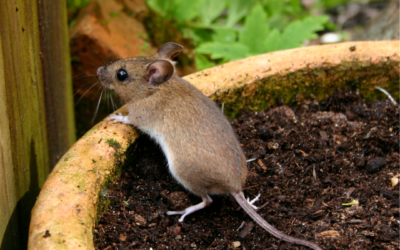Where do mice go in winter?
If you have mice in your home during winter, you’re not alone.
Mice don’t hibernate when temperatures drop. Like any other warm-blooded animal, they need protection from the cold during the winter months. They also need alternative food sources, because seeds and grass can be harder to find. Your lovely, warm home offers the perfect winter protection, and that means you’re likely to find more evidence of mice in and around your home in winter.
What attracts mice to your house?
Other than warmth, your home might offer additional amenities mice appreciate. While they prefer fruit, seeds, and grains, they’ll eat almost anything. Pet food, stove crumbs, and improperly stored pantry items provide a virtual mouse buffet.
Your leftovers, nuts, snacks, and treats from last night’s holiday gathering could act as an invitation to mice. While mice get most of the water they need from the foods they eat, they’ll take a drink if it’s available. A sink filled with dishes or a soaking pan may be a headache for you, but to a mouse, it’s a thing of joy. You may not have planned for another houseguest, but you could end up with a few anyway.
Do most homes have mice?
The rough estimate is that each year, as many as 21 million homes experience a mice infestation. However, many cases are unreported because the signs can go unnoticed. House mice are the most common mammal in the United States, so you’re not alone if you have mice in your home during winter.
Most of us have cluttered storage areas in our garages and attics, but our homes are often overflowing with extra places to hide during the holidays. Mice love clutter because it gives them shelter and nesting materials.
You could be providing mice with everything they need to be comfortable this winter. Live trees make excellent watering holes for all sorts of critters. Add in some boxes and wrapped gifts, the candy canes hung on it with care, and you have one exquisitely-decorated and expensive mouse habitat.
Does having mice mean your house is dirty?
No! Many clean homes have mice. Unfortunately, it’s almost impossible to eliminate every food source and safe space where mice might live. Even the most organized and clutter-free home is capable of providing comfort to mice in winter. They’ll take up residence in your walls and create tiny doorways to access food and water. You’re not to blame for your infestation, but that doesn’t mean you can’t take measures to stop it.
How do I know if I have mice?
The easiest way to tell if you have mice is to see one of the tiny rodents. Unfortunately, if you do see one, there are probably a dozen or more. Fall is the most significant time for breeding, but mice can have litters any time of year. If you see a baby mouse, there are other baby mice nearby. Mice are shy and surprisingly adept at evading direct detection, but they leave plenty of other signs around the house.
Rodents have a strong urine odor. If you smell animal urine for no apparent reason, you might have mice doing their dirty business in your walls and dark corners. Speaking of business, you might also find little gifts in your corners. We’re not talking about cute miniature boxes and bows. Their gifts are usually left in the form of small, dark pellets. Mice poop often, so we’re talking about a lot of droppings. If you see droppings that range in size, you’ve got baby mice and adult mice.
Many homeowners report hearing soft scratching sounds in the walls when they have an infestation. Pets hear and smell much better than we do, so you might see them barking at the wall, pawing at crevices, or appearing alert in areas mice have set up shop.
Another sign mice have moved in for the winter is gnawing. Mice and other rodents will chew holes in your walls to create passages to and from their nests. Insulation is an ideal nesting material, and the wires inside your walls provide excellent opportunities for them to sharpen their teeth, both of which can cause costly repairs.
How much damage do rodents cause?
Every year, rodents cause more than $20 billion in damages to residential and commercial properties. Damage to the exterior and interior of your walls and electrical wiring is often accompanied by the smell of urine and feces emanating from places unseen. The costs add up quickly.
The cost to your health may be the biggest price you pay. House mice spread diseases like salmonella, lymphocytic choriomeningitis virus (LCMV), and hantavirus. Even if you don’t touch them, and you carefully inspect your food, their feces turns to dust, which floats through the air of your home and into your lungs. Therefore, it’s crucial to your family’s well-being to deal with a rodent infestation as quickly and effectively as possible.
How do you get rid of mice in winter?
Mice are resilient and intelligent creatures designed to thrive in a variety of conditions. Professionals use a multi-frontal approach to eliminate the problem and keep it from returning. The team at 855Bugs can help you treat and prevent mice and other rodents from making your home theirs for the winter—and throughout the year.
Learn more about mice behavior and how to save on our Wildlife Exclusion service.




